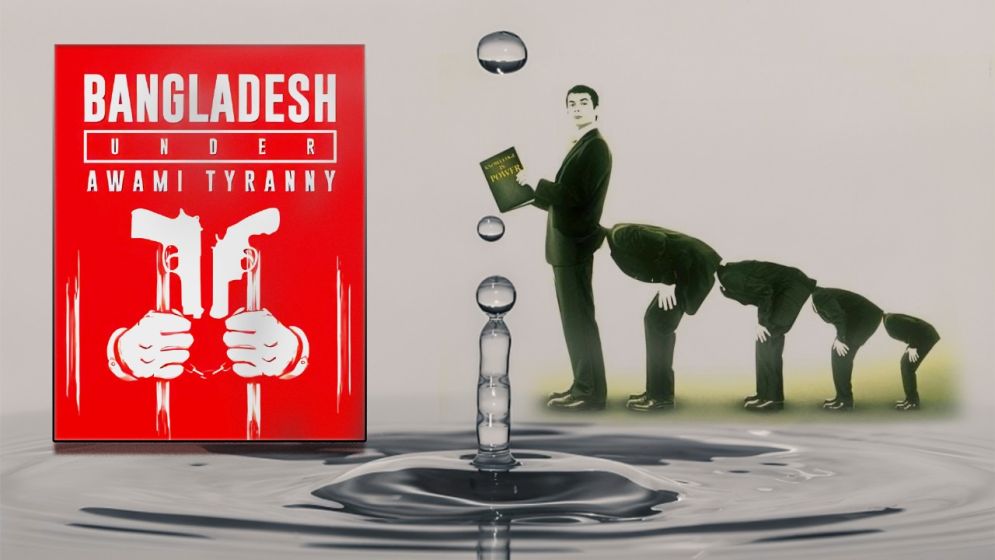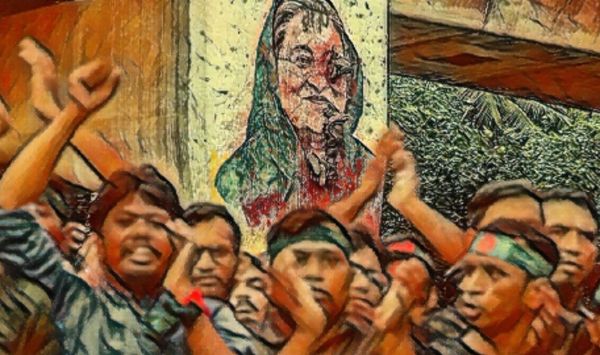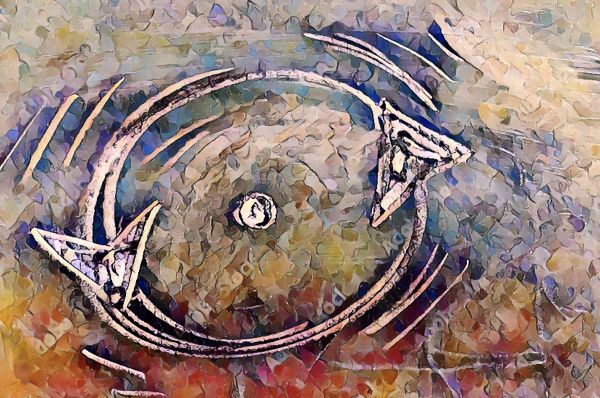The ‘liquid society’ that Awami League built and a generation that it swallowed..

You want to know what kind of society fails to produce people with a solid sense of self? Or which kind of society breeds despair–even after revolutions, after uprisings, after the so-called collapse of fascism?
The answer is simple: a liquid society.
In a liquid society, values are unstable, identities are malleable, and people flow wherever power seems to pool. Integrity dissolves into expedience. Principles are replaced by survival strategies.
Sociologist Zygmunt Bauman warned of this world decades ago, and closer to home, political psychologist Ashis Nandy once noted, “In rapidly changing societies, the struggle against autocracy is less effective for the problem of losing one's self in the face of various strategic attacks of the modern world.”
Nowhere is this loss of self more starkly visible than in contemporary Bangladesh.
We endured a brutal period of fascistic rule. The Awami League regime–whatever it once claimed to stand for–gradually blurred into every institution, every crevice of society, until one could not speak without first gauging: is this safe? Is this allowed?
To survive, many surrendered. Some joined the ranks of the oppressors to avoid being crushed. Others remained silent. The most cynical became collaborators.
These choices were more moral than political. To align with injustice out of fear or gain is not simply to betray citizenship–it is to forfeit one’s dignity.
Socrates believed that knowingly committing injustice corrodes the soul. Bangladesh's soul bears that corrosion now. The proof is in our martyrs: the children and young people who gave their lives to stop what we–collectively–failed to confront.
But what happened after the fall? Did society begin to heal? Did the structures of power recalibrate toward justice?
No. What we saw instead was shapeshifting.
As if overnight, the Awami League vanished–in name rather than in accountability. The same people who once enforced its authoritarian culture now rebrand themselves as soldiers of resistance.
Former enforcers of injustice open new shops of virtue, selling revolution wholesale, no refunds.
This is the essence of the liquid society: when the ruling party's tide recedes, its adherents don’t confront their past. They reinvent themselves, without reflection or repentance.
They adapt to the next trend, the next winner, the next party. They mistake flexibility for wisdom, opportunism for survival, and cowardice for pragmatism.
-6867c11e35e05.png)
Blatant admission of hypocrisy
This isn’t just a political pathology. It’s a civic cancer.
Nations cannot progress–morally, democratically, or institutionally–when a critical mass of their people live without anchoring principles. It's not that humans are inherently unjust. We all make mistakes. We may even believe in dangerous things.
But a healthy society depends on individuals who can recognize their errors, take responsibility, and change with intention–not convenience.
In the absence of such a reckoning, liquid people will always find a way to align with power. And in doing so, they will continue to erode the very foundations of any real democracy.
We can’t build an advanced nation out of people who refuse to look in the mirror.
I first encountered the idea of a “liquid society” while reading Chronicles of a Liquid Society, a posthumous collection of essays by Umberto Eco. At the outset, Eco credits the term to Zygmunt Bauman–the Polish-British sociologist whose intellectual fingerprints are all over our disintegrating world.
Bauman used “liquid” not as a metaphor for flexibility, but as a diagnosis of moral erosion. Titles like Liquid Love, Liquid Life, Liquid Modernity all explore what happens when human relationships, identities, and commitments become unmoored, when permanence becomes passé, and when adaptability turns into moral compromise.
There isn’t time here to unpack Bauman’s entire body of work. But we don’t need to look further than Bangladesh to see the concept’s terrifying clarity.
A nation that has spent 55 years in post-liberation flux finds itself, once again, in a tragic state. Rulers shoot protestors like birds in a field. Civil liberties exist in name only. The truth is, this moral and political crisis isn't just the fault of those in power.
It’s the product of our intellectual class–those who should have been society’s conscience, but instead chose to be courtiers.
Rather than speak truth to power, they polished its shoes. Rather than build a democratic culture, they became peddlers of comfort narratives. Had they anchored themselves to national interest–rather than regime interest–we might have built a self-reliant, morally grounded republic.
Instead, with rare exceptions, our public thinkers failed the test of integrity. Their ideas were for sale, their loyalties seasonal. And now, after years of legitimizing authoritarianism, they rebrand themselves as born-again critics.
Even a cyclone would be embarrassed by the speed of their ideological spin.

Shifting winds, shifting allegiance
These intellectual weather vanes aren't just disappointing–they are dangerous.
They enable authoritarianism, launder its crimes with sophisticated language, and then vanish into new disguises when the tide turns. They are the architects of our current ideological rot.
But they are not alone.
Our entire social structure is saturated with what I call “liquid opportunists.” People who don’t just adapt to new power structures–they rehearse for them in advance. People who can switch sides mid-sentence.
In Bangladesh, the reflex to conform is so deep that even jackfruit pods get counted before they ripen. Opportunism isn’t a survival tactic anymore–it’s a national instinct.
Today, the new wave of hypocrisy is dressed in the rhetoric of resistance. BNP loyalists, Jamaat sympathizers, Yunus devotees–many of whom were silent or complicit during the Awami League’s long rule–have emerged as guardians of the nation’s moral compass.
But look closely, and you’ll see the same faces, the same deals, the same postures–just repackaged.
They rode the coattails of the Awami League when it was in power. Now they wave the flag of opposition while replicating the same authoritarian reflexes. That’s why, even in the absence of the League, its ghost haunts every corner of governance–from the bureaucracy to government institutions.
Because the people inside the system haven’t changed. Only their affiliations have. And we do not suffer from a lack of political turnover. We suffer from a lack of moral transformation.
This is what a liquid society looks like: where values are negotiable, integrity is rare, and the past is never truly reckoned with. Until we confront this condition–until we produce people who can say, “I was wrong,” and mean it–we will remain trapped in cycles of repression, cynicism, and make-believe change.
And the cost of this liquidity is not abstract. It is paid in blood, in lost children, in squandered futures.
But now, in a grotesque second act, we’re seeing a fresh infestation: opportunists suddenly swarming around the erstwhile opposition like moths to a flame. A new class of self-declared BNP intellectuals has emerged–loud, insistent, and depressingly familiar.

Cycles repeated, shamelessly
This isn't some fringe phenomenon though. Before the 2018 elections, a cluster of opportunistic journalists and public intellectuals quietly shifted their loyalty toward the BNP, convinced it was on the cusp of returning to power.
When the so-called "night vote" handed the party just seven seats, they didn't retreat–they recalibrated. They played both sides, hedging their bets, waiting out the regime.
Now, after years of sycophancy, some of the same people who once treated even Mujib's shadow as sacred are busy reciting paeans to Zia and the BNP. There’s no shame, no irony–just a seamless ideological backflip, as though history has no memory and the public no spine.
This is more than distasteful. It's dangerous.
Are these people being welcomed because of the BNP’s overreliance on democratic openness? Or is it simply that the party lacks the institutional immune system to resist parasites?
I don’t know. What’s clear is that the grinning opportunist, always first to arrive and last to leave, is once again in the spotlight–polishing a new podium, mouthing a new loyalty.
These are the very people who, by flattering power and feeding its worst instincts, drive governments toward tyranny. They don’t believe in any ideology. They believe in access. In relevance. In the room where the deals are made.
They are, quite literally, the human embodiment of liquid modernity–formless, faithless, foundationally hollow. They’ll bend to any shape, conform to any regime. Today BNP, yesterday AL, tomorrow whoever offers the most visibility and the lowest moral cost.
And the tragedy is this: whichever party embraces them will be corrupted. They are not just dead weight–they are toxic. Not only to politics, but to a society trying to recover its moral bearings.
Resisting them requires more than just political will–it requires a cultural shift. We must learn to value conviction over convenience. Even if we disagree with someone’s stance, we should value the courage to take one.
Because when everyone races to align with the ruling party–whoever that is–we end up with a society full of pliant echo chambers and institutional cowardice.
If we continue to reward those who float to the top by avoiding principle, those who dare to stand still–those with spine–will disappear. And democracy doesn’t die in loud coups. It erodes quietly, when no one respects dissent and everyone competes to flatter the throne.
Unity can and should emerge from principled disagreement–that is the essence of democracy. But when the entire political and intellectual class rushes to sit in the winner’s lap, all we’re left with is a sycophantic society, incapable of introspection or reform.
Let’s be clear: a person who is everyone’s friend is, in truth, no one’s friend. A society that embraces such people as its moral voice is headed for moral ruin.
After an uprising, what a country needs most isn't just new leadership or slogans–it needs people of integrity. People who possess that rare, essential combination of self-respect and moral clarity.
If we fail to identify and reject the shapeshifters now donning revolutionary disguises, we will watch, once again, as fascism plants its roots in the fertile soil of our collective forgetfulness.
—
Rezaul Karim Rony is a writer and thinker. He is the editor of Joban magazine

